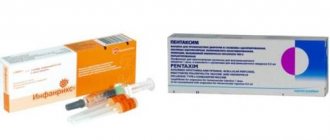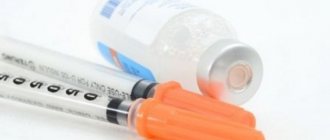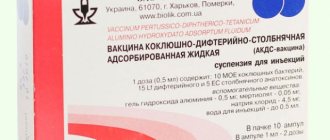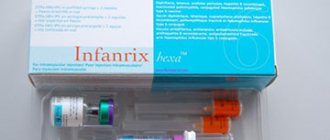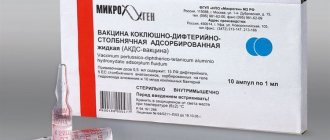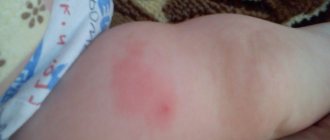To ensure your baby’s health is at its best, every few months he must receive another vaccination, which allows him to strengthen his immune system and protect him in the future from numerous problems and undesirable consequences. Almost everyone gets vaccinated, but the vaccination varies, parents can choose which option suits them best. But to do this, you first need to understand what the difference between different vaccinations is, how one vaccination differs from another, namely, what is better for a child, DPT or Pentaxim? What is the difference? Or can I choose Infanrix or other analogues? Let's take a closer look at these drugs.
French vaccine Pentaxim
When asked which vaccine will be safer and more effective (paid or free, domestic or imported), medical experts have different opinions. As a rule, foreign remedies fight a large number of diseases and are accompanied by fewer adverse reactions.
One of the popular immunological drugs is the French Pentaxim vaccine. Unlike DPT, which is done in government institutions, it also prevents the development of polio and hemophilus influenzae infection. In addition, the drug contains a split pertussis virus, the shell of which has been removed. That is why the introduction of such an injection, in comparison with the domestic one, is easier for children to tolerate.
On the Internet you can find a lot of positive reviews about this drug. Sometimes parents choose whether to purchase the Infanrix or Pentaxim vaccine. Your attending physician will help you choose the most suitable one.
Features of the Pentaxim and DTP vaccination scheme
The vaccine is used three times: at 3 months, 4.5 months and 6 months, with an interval of exactly 1.5 months. At 18 months, revaccination is carried out. This vaccination actually provides 100% protection against whooping cough, tetanus and diphtheria.
Vaccination with Pentaxim is also carried out three times from 3 months. All subsequent vaccinations are carried out no earlier than 1–2 months later. Revaccination is prescribed at one and a half years from the birth of the child.
All parents must know about the features of the Pentaxim and DPT vaccination regimen!
If the schedule was violated, Pentaxim is used like this:
- The first vaccine and the second from 6 months to 1 year. The third is carried out not diluted with lyophilisate, but revaccination with the full preparation;
- After 1 year, the first revaccination is prescribed with the full preparation, and all subsequent ones are administered without protection against Haemophilus influenzae.
In cases of forced replacement of drugs, if there is no other drug available, be sure to consult a specialist and find out the specifics for use.
Tetraxim
An improved French drug that was developed for children with hypersensitivity. Unlike many other immunological agents, it does not contain components such as merthiolate and formaldehyde. This is what makes its use safer, without negative side effects. In addition to the described advantages, the advantage of the vaccine is that it contains components that protect the baby’s body not only from tetanus, diphtheria and whooping cough, but also cope with the development of polio.
Tetraxim, based on reviews from qualified specialists, is the safest. That is why its cost is higher than that of existing analogues.
Flaws
Reviews show that Pentaxim is a very good replacement for the original DPT, but this vaccine is not without its drawbacks and side effects, so it is very important to consult with your doctor about their danger for a specific individual organism. These include:
- impossibility of use with even a slight rise in temperature, with hypersensitivity to the components of the drug and the presence of encephalopathy;
- impossibility of use in case of a sufficiently developed allergy to individual components;
- low risk of shock and convulsions;
- a rare chance of swelling and the development of high body temperature.
It is worth considering that these disadvantages are relative, because all of them are sometimes present to an even greater extent in DTP and budget foreign analogues.
Belgian vaccines Infanrix and Infanrix Hexa
Infanrix and Infanrix-Hexa are a widely used vaccine in our time, which is produced in Belgium. It is aimed at combating diphtheria, tetanus, whooping cough, polio, hepatitis B and Haemophilus influenzae. The composition of the drug is free of methiolate and formaldehyde - this allows the child’s body to more easily tolerate its effects and reduces the likelihood of side effects.
What types of imported vaccines are there?
Some people prefer to give their child an imported vaccination instead of a domestically produced DTP vaccine.
There are many varieties of these products. The compositions of the drugs are similar, although there are some peculiarities.
French
A French vaccine called Pentaxim is similar to DTP, but it is considered an improved version. The drug uses the pertussis virus in a split form, and its shell has been removed. Therefore, children tolerate such a vaccine much easier, unlike the domestic one.
Another feature is the presence of additional components that create immunity against Haemophilus influenzae and polio. Those. The product helps against 5 diseases.
The domestic vaccine can be replaced with a drug called Tetrakok. This is also a French development. Combines DTP and polio vaccinations. If necessary, it can be administered together with the Haemophilus influenzae vaccine.
When compared with the previous French-made drug, Tetracoca contains less harmful sorbent.
Tetraxim is also a French replacement for the DTP vaccine.
This product is designed specifically for children who are highly susceptible.
Unlike many other similar drugs, this one does not contain merthiolate or formalin. Thanks to this, the medicine is safer and does not cause side effects, which can facilitate the process of creating immunity against diseases.
The vaccine contains components that protect the child not only from whooping cough, diphtheria and tetanus, but also from polio.
Belgian
Belgian vaccinations are common instead of domestically produced DTP. For example, Tritanrix NV is popular. It forms an immune response in the human body against whooping cough, diphtheria and tetanus.
Its special feature is that it counteracts hepatitis B. For regions where this disease is common, such a vaccine can replace 2 injections at once.
Infanrix and Infanrix-Geta are also Belgian vaccines popular in the CIS countries. They do not contain formaldehyde and merthiolate, which is an advantage. It will be easier for the body to tolerate the effects of the product.
As for the anti-pertussis component, it does not contain the cellular structures of the virus. Instead, an toxoid is used, due to which there are no side effects in the period after vaccination.
The product counteracts not only whooping cough, tetanus and diphtheria, but also other infections: hemophilus influenzae, hepatitis B and polio.
Infanrix IPV is a lightweight formula of the previous drug, so the names are similar. The composition does not contain an toxoid, which prevents the development of hemophilus influenzae infection and hepatitis.
From UK
An example of imported DTP is Infanrix. This drug is produced not only in Belgium, but also in the UK. The vaccine is different in that it is not just purified, but has the highest degree.
The foreign preparation does not contain formaldehyde and merthiolate. In addition to pertussis bacteria, there is also an toxoid, due to which the child’s body better absorbs and tolerates the drug.
If Infanrix counteracts 3 standard diseases, then Infanrix Penta is a combined option.
The drug additionally resists hepatitis B and polio. The vaccine is a cell-free inactivated type. What do you think are the most important factors when choosing a medical facility?
Infanrix Hexa is different in that it combines components against 6 diseases at once, such as diphtheria, whooping cough, tetanus, polio, hepatitis B and hemophilus influenzae infection.
Which drug to choose, imported or domestic?
In order to choose the vaccine that is best for your child, it is recommended that you familiarize yourself with the following differences between domestic and imported vaccines:
- Most often, drugs from foreign manufacturers are acellular and acellular. This significantly improves the tolerability of the drug and reduces the likelihood of swelling, redness and hardening of the injection area;
- As a rule, imported drugs do not contain merthiolate. This component is allergenic and, when entering the baby’s body, often provokes unpleasant allergic reactions (Quincke’s edema, rash, itching);
- In addition to whooping cough, diphtheria and tetanus, many foreign remedies also protect against hepatitis, polio and Haemophilus influenzae infection. Therefore, with their help it is possible to reduce the number of vaccinations;
- Imported drugs protect 2-3% less than domestic ones;
- The Russian DTP vaccine is administered in a medical institution absolutely free of charge, while purchasing a foreign shot requires spending a lot of money.
Medical experts recommend initially getting a free vaccination at the clinic and watching how the child’s body reacts. If the side effects are easily tolerated, continue to be vaccinated with the domestic drug; if severe reactions to the drug occur, replace the DTP with an imported injection.
DTP or Pentaxim - what's the difference?
The key difference between the two drugs described above is in the composition . The domestic vaccine gives the child protection against three diseases, while the foreign Pentaxim protects against five.
But the most important thing is that DTP contains, although killed, whole cells of pertussis infection, while Pentaxim contains only fragments of cells. It is the cell membrane of this “infection” that is most pathogenic, and it is to it that the body reacts most strongly.
In addition, there is a difference in price . DTP is cheaper, most often children are vaccinated with it free of charge, as part of the vaccination schedule. And in most cases, parents have to buy imported Pentaxim themselves, and at a rather steep price. But is it possible to save on a child’s health? No.
Although Pentaxim has fewer side effects than the domestic vaccine, this is an advantage only in terms of parental comfort, but in terms of immunology it is rather a disadvantage, and here DPT definitely wins.
Are there any differences in adverse reactions?
Side effects are absolutely the same for all vaccinations:
- compaction at the injection site, formation of a small lump in it;
- increase in body temperature;
- deterioration of general condition: drowsiness, lethargy;
- the occurrence of allergic reactions (urticaria, rash, anaphylactic shock, Quincke's edema);
- redness and swelling of the skin in the area of vaccination;
- muscle spasms;
- pain in the limb into which the drug was injected.
However, such adverse reactions of the body to the vaccine occur much less frequently when using a foreign product. They have this advantage because foreign pharmacists have excluded some components that have a negative effect on the child’s body from the composition of their immunological preparations.
Repeated vaccination
The broader focus of Pentaxim and the ability of the domestic vaccine to cause allergic reactions determine the following conditions for choosing a drug for revaccination:
- in case of a strong reaction (the drug is difficult for the baby to tolerate) to a domestic drug, it is recommended to replace it with a foreign analogue of DTP;
- if Pentaxim was used, replacement with a Russian analogue is undesirable;
- when using a domestic vaccine, it is possible to replace it with Pentaxim.
These subtleties are explained by the fact that DTP is more difficult to tolerate.
Are vaccines interchangeable?
Both drugs are interchangeable, but taking into account the differences listed above.
Are there different contraindications?
As with adverse reactions, contraindications do not differ from each other depending on the country of origin. The vaccination is not given or postponed to a more favorable time in the following situations:
- if you are intolerant to one of the elements that is part of the vaccine;
- during the progression of tuberculosis, hepatitis or AIDS;
- during exacerbation of chronic, infectious and non-infectious diseases;
- with pathological disorders in the functioning of the nervous system;
- if a dangerous reaction occurred to the previous administration of an immunological agent.
Neglecting the above rules often results in serious complications.
DTP or Pentaxim - reviews from parents
Of course, you should not rely on reviews about the drug alone, but it is at least wrong to neglect the experience of parents who are familiar with at least one of the vaccines. We have collected different opinions on both vaccinations:
Alla, 31 years old:
I have two kids - one is one year old, the second is almost three. The eldest was given DPT, everything was as it should be, according to the calendar. There was a side effect. And the leg did not obey for the first day, and I had a temperature, but I would not say that everything was as critical as some parents say. But the youngest was less fortunate - the reaction to a regular vaccination did not fit into any framework at all, the temperature was below 40, he screamed for two hours without stopping, he suffered. Switched to Pentaxim. And here there were no consequences, so, as they say, who cares what.
Rita, 28 years old:
We, like all decent people, got all the vaccinations. Until it came to whooping cough-diphtheria-tetanus domestic disaster. The reviews basically scared me, I decided not to risk it and bought Pentaxim. We have already been vaccinated three times, and thank God we are all successful. The doctor just gave us an injection, we whimpered for five minutes, and we went for a walk in the park. Without fevers and all the horrors that are said about other vaccines. So I recommend it from personal experience.
Olga, 25 years old:
I don’t know what the problem with DTP is generally. The doctor and I were afraid that the vaccine was difficult, and my friends tried to dissuade us. Then the pediatrician simply prescribed an anti-inflammatory drug for the baby to drink three days before the vaccination, and three days after. And at least that's it. On the first day, my girl’s leg itched a little, the injection site hurt, it was reddish. That's all. No sky-high temperatures, no torment. Of course, I won’t recommend it - maybe we were just lucky, but I don’t see the point in spending money on imported drugs.
Irina, 27 years old:
We deliberately intended to give our son Pentaxim. They found the first vaccination with grief and bought it. There were no consequences; the vaccine in this regard is very good. But for the second vaccination they simply didn’t find it, so I had to take a risk and give DPT. This is quiet horror. The temperature is 38-39, the child screams, arches, the leg does not move. Of course, we suffered through fear. But fortunately, on the third day everything went away on its own. A terrible vaccine, some kind of simple abuse of children.
Alena, 34 years old:
When I gave birth to my little one, almost no one knew about analogues of the domestic drug. They did it and endured it. Anything could happen, my girl had a fever, and her leg hurt, but, I must say, after the third revaccination everything went very calmly. For our little one, the question was already on the table, because Pentaxims, Infanrixes, and so on appeared. But, to be honest, I didn’t take any risks. We already know what to expect from DPT, and we probably got a good batch; it didn’t go beyond temperature and compaction on the stem. In general, parents must decide for themselves. Much also depends on the child’s health status.
Are vaccines interchangeable?
Many parents are interested in the question of whether it is possible, if the body reacts unfavorably to the DTP drug, to replace it without harming the baby and achieve a positive result.
Medical experts say that there has been no scientific evidence that it is impossible to replace the drug used with another. In this case, if a child has an adverse reaction to a domestic immunological vaccine, then it is quite possible to select an imported drug and replace DPT. However, it is recommended that the choice of remedy be left to the attending physician, since some foreign vaccinations also protect against hepatitis, polio, etc. In this case, the doctor will need to review and possibly change the schedule for administering the selected drug.
Basic option
In our country, the main vaccination option for a baby is the domestic DTP vaccine. Due to local production, it is inexpensive, which is a frequent reason for its use. The three main diseases it helps with are:
- whooping cough;
- diphtheria;
- tetanus.
The first application of the vaccine is carried out at three months of age. In order for immunity to develop normally, it is best to administer the vaccine three times at an interval specified by the attending physician.
It is strictly necessary to give an injection, because these diseases are very poorly tolerated by children. The mortality rate for tetanus is close to 90%; diphtheria, if vaccination is not carried out on time, kills approximately every fourth person. Even if the disease has been stopped, its chronic consequences may remain, for example, cough, problems with the nervous and respiratory systems of the human body.
The vaccination is simple, basic and not very modern, which is why many doctors argue that it is better to replace it with current imported analogues, including the Belgian Pentaxim.
